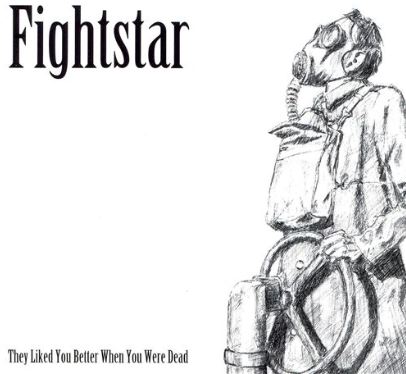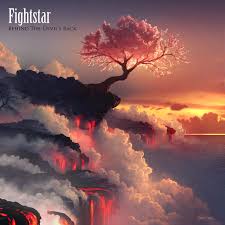How Charlie Simpson and Fightstar proved the naysayers wrong

It was a Friday morning in mid-January 2005. The media had gathered for an eagerly anticipated press conference at the Soho Hotel in London. It would soon be announced that UK pop sensations Busted were splitting up. It was in fact Charlie Simpson, with his distinctive husky vocals and bushy eyebrows, who was leaving the trio to focus on his musical side-project Fightstar (who only the day before had announced a surprise 14-day UK tour). The news would leave millions of teenage hearts shattered in an instant. Few though, if any gathered that day, could have realised that this was actually the launching pad for one of the best British rock bands to surface in recent years.
The origins of Fightstar date back as far as 2003, when Simpson, along with James Bourne and Matt Willis, were still playing sold-out shows at Wembley Arena with pop act Busted. One evening, Simpson met fellow songwriter-guitarist Alex Westaway and drummer Omar Abidi at a party. Perhaps unbuckled after a few too many drinks, the trio jammed out to the iconic Rage Against the Machine anthem “Killing in the Name.” With that, the torch paper had been lit. Fast forward to November 2004, and the four-piece, now accompanied by bassist Dan Haigh, were recording their debut EP, They Liked You Better When You Were Dead with producer Mark Williams. Propelled by it’s crunching and dynamic single “Palahniuk’s Laughter”, Fightstar’s music was surprisingly (to some at least), well, bloody darn good.
Right from the off the band were subject to intense scrutiny (if not outright scepticism), thanks to Simpson’s pop past. Whatever your opinion of Busted, they were at least respectable in the sense of writing songs and playing their own instruments. Indicative of the rather snobbish and elitist “rock scene” at the time, there seemed to be a genuine scorn towards Simpson’s new musical endeavour. Indeed, the band were famously greeted with a barrage of piss-filled bottles when opening their set at the 2005 Reading Festival. In spite of this, and with the kind of siege mentality that epitomised their early years, the band were given a standing ovation following their main stage set at the very same festival the following year.
Fightstar debuted with the EP They Liked You Better When You Were Dead on 28 February, 2005. Their early sound, whilst certainly well-trodden, excelled thanks to it’s seamless shifts in quiet/loud dynamics. The quartet understood how to build tension in their songs by melding soft and melodic verses with hefty, biting choruses. The superb “Amethyst”, easily one of the band’s best songs, is a great example of this. Alex Westaway’s tender and venerable falsetto is perfectly offset by Simpson’s throaty roar during a heavy, colossal refrain. “Mono”, named after the Japanese post-rock band of the same name, is a slow building six-minute epic that only grows more memorable with each and every listen. It’s first four minutes, beautiful and plaintive, are wonderfully juxtaposed by a crushing and gut-wrenching finale. If it wasn’t clear before, it certainly was now. Simpson and co weren’t fucking around. Fightstar could pen highly charged and hard-hitting rock songs.
Grand Unification, the band’s debut full-length, followed on March 13, 2006. Produced by Colin Richardson, it was soon heralded as “one of the best British rock albums of the last decade” by then Kerrang! editor Paul Brannigan. It was the kind of recognition that made the initial hardships all the more worth it. By this point, the band were really finding their feet. The record’s best song, “Sleep Well Tonight”, a progressive and widescreen rock anthem, showcases Fightstar at their dynamic and brilliant best. “Paint Your Target”, interwoven by the vocal trade-offs between Westaway and Simpson, finds the sweet spot of lofty melodies amid crunchy, down-tuned riffs. The album, influenced by and loosely based on the anime series Neon Genesis Evangelion, was perfectly visualised by it’s artwork from digital artist Daniel Conway. Like the gigantic closer “Wake Up”, Grand Unification genuinely felt (at least in the British rock scene), vital and epic.
“…to make something utterly brutal and really heavy and on the other side have something really delicate and beautiful. The fusion of those things is what Fightstar does.”
Charlie Simpson on the band’s musical vision. The gargantuan “Mono” is a shining example of this.
The band’s sophomore album, One Day Son, This Will All Be Yours was released on September 24, 2007. Whilst it’s sound remained largely faithful to that of it’s predecessors, the band branched out in both more melodic and heavier musical soundscapes. Standouts like “99” and “One Day Son” further showcased their knack of writing excellent post-hardcore. Tender and earthy cuts like “Unfamiliar Ceilings” and “You & I” (both featuring superb guest vocals from Rachel Haden), are eloquently countered by the almighty heavy metal of “Tannhäuser Gate” and “Deathcar”. The critics were once again on side. Q magazine pointed out how “the intricate instrumental passages, multi-tracked vocal harmonies and pounding riffs hint at Muse-scale ambition and intellect.”
Now completely comfortable in their own skin and crucially, well respected, third studio effort Be Human felt like a pivotal moment in Fightstar’s career. Whilst generally considered a departure from the body of work that preceded it, the album still built upon and maintained their post-hardcore roots. Heavily symphonic, Be Human featured a 16-piece orchestra (led by composer Audrey Riley), and even a school chamber choir on lead single “The English Way.” Diverse and ambitious, the breezy pop of “Mercury Summer” felt like Simpson finally letting go. “War Machine”, a pummelling and brilliantly constructed rock-opera, wouldn’t feel out of place on a Hollywood film score. It’s the Cure-inspired “Give Me the Sky” though, aiming for the stars with it’s sparkling, awe-inspiring crescendo, that really demonstrated the band’s progression.

Following the deluxe re-release of Be Human in 2010, which included four new tracks and the excellent Unplugged at the Picturedrome DVD, the band entered a hiatus that would span the next four years. During this time, Simpson focused on his solo career and released two folk-orientated, and largely excellent acoustic records. Meanwhile, Haigh and Westaway joined forces on their synthwave project Gunship. By the time the four-piece reunited, they were ready to write and record their most cohesive album to date, Behind the Devil’s Back. Released on October 16, 2015, the LP was an independent venture that was partly crowd-funded via a Pledge Music campaign. Serving as the spiritual successor to their debut Grand Unification (with it’s grandiose album art and return of the original band font), Behind the Devil’s Back did not disappoint.
With the kind of riff-heavy, yet lofty and melodic sound that the band had become known for, the album incorporated new sonic textures thanks to the addition of vintage synthesizers and keys. Acting as the record’s centrepiece, the 80s inspired “More Human than Human” absolutely soars. Alex Westaway, on lone vocal duty here, is allowed to shine with his melancholic, synth-backed verses that lead to a sky-scraping, guitar-soaked chorus. The Deftones-esque title track “Behind the Devil’s Back” is an immediate standout, whilst memorable and equally epic opener “Sharp Tongue”, is a throwback to the band’s early sound.

In summary, perhaps the greatest compliment I can pay the band is that they allowed their music to do the talking. Initially dismissed and incessantly mocked, Charlie Simpson and his band proved the naysayers wrong. It wasn’t a gimmick. Simpson was genuine with his desire to explore a passion for heavy, yet melodic rock. It’s easy to forget that the frontman was only 19 years old when he left Busted. Perhaps he tried a little too hard during the early days. He was desperate to prove a point and be seen as a credible rock musician. With Fightstar, he achieved this and more thanks to a vast back catalogue rich in excellent songs. And, as the wonderful “More Human than Human” attests, “let all our ghosts lie, it’s over”.
Further reading:
